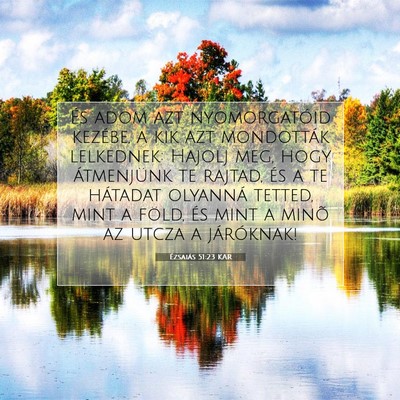Old Testament
1 Mózes 2 Mózes 3 Mózes 4 Mózes 5 Mózes Józsué Bírák Ruth 1 Sámuel 2 Sámuel 1 Királyok 2 Királyok 1 Krónika 2 Krónika Ezsdrás Nehémiás Eszter Jób Zsoltárok Példabeszédek Prédikátor Énekek Éneke Ézsaiás Jeremiás Jeremiás siralmai Ezékiel Dániel Hóseás Jóel Ámos Abdiás Jónás Mikeás Náhum Habakuk Sofóniás Aggeus Zakariás MalakiásChapter
Zsoltárok 1 Zsoltárok 2 Zsoltárok 3 Zsoltárok 4 Zsoltárok 5 Zsoltárok 6 Zsoltárok 7 Zsoltárok 8 Zsoltárok 9 Zsoltárok 10 Zsoltárok 11 Zsoltárok 12 Zsoltárok 13 Zsoltárok 14 Zsoltárok 15 Zsoltárok 16 Zsoltárok 17 Zsoltárok 18 Zsoltárok 19 Zsoltárok 20 Zsoltárok 21 Zsoltárok 22 Zsoltárok 23 Zsoltárok 24 Zsoltárok 25 Zsoltárok 26 Zsoltárok 27 Zsoltárok 28 Zsoltárok 29 Zsoltárok 30 Zsoltárok 31 Zsoltárok 32 Zsoltárok 33 Zsoltárok 34 Zsoltárok 35 Zsoltárok 36 Zsoltárok 37 Zsoltárok 38 Zsoltárok 39 Zsoltárok 40 Zsoltárok 41 Zsoltárok 42 Zsoltárok 43 Zsoltárok 44 Zsoltárok 45 Zsoltárok 46 Zsoltárok 47 Zsoltárok 48 Zsoltárok 49 Zsoltárok 50 Zsoltárok 51 Zsoltárok 52 Zsoltárok 53 Zsoltárok 54 Zsoltárok 55 Zsoltárok 56 Zsoltárok 57 Zsoltárok 58 Zsoltárok 59 Zsoltárok 60 Zsoltárok 61 Zsoltárok 62 Zsoltárok 63 Zsoltárok 64 Zsoltárok 65 Zsoltárok 66 Zsoltárok 67 Zsoltárok 68 Zsoltárok 69 Zsoltárok 70 Zsoltárok 71 Zsoltárok 72 Zsoltárok 73 Zsoltárok 74 Zsoltárok 75 Zsoltárok 76 Zsoltárok 77 Zsoltárok 78 Zsoltárok 79 Zsoltárok 80 Zsoltárok 81 Zsoltárok 82 Zsoltárok 83 Zsoltárok 84 Zsoltárok 85 Zsoltárok 86 Zsoltárok 87 Zsoltárok 88 Zsoltárok 89 Zsoltárok 90 Zsoltárok 91 Zsoltárok 92 Zsoltárok 93 Zsoltárok 94 Zsoltárok 95 Zsoltárok 96 Zsoltárok 97 Zsoltárok 98 Zsoltárok 99 Zsoltárok 100 Zsoltárok 101 Zsoltárok 102 Zsoltárok 103 Zsoltárok 104 Zsoltárok 105 Zsoltárok 106 Zsoltárok 107 Zsoltárok 108 Zsoltárok 109 Zsoltárok 110 Zsoltárok 111 Zsoltárok 112 Zsoltárok 113 Zsoltárok 114 Zsoltárok 115 Zsoltárok 116 Zsoltárok 117 Zsoltárok 118 Zsoltárok 119 Zsoltárok 120 Zsoltárok 121 Zsoltárok 122 Zsoltárok 123 Zsoltárok 124 Zsoltárok 125 Zsoltárok 126 Zsoltárok 127 Zsoltárok 128 Zsoltárok 129 Zsoltárok 130 Zsoltárok 131 Zsoltárok 132 Zsoltárok 133 Zsoltárok 134 Zsoltárok 135 Zsoltárok 136 Zsoltárok 137 Zsoltárok 138 Zsoltárok 139 Zsoltárok 140 Zsoltárok 141 Zsoltárok 142 Zsoltárok 143 Zsoltárok 144 Zsoltárok 145 Zsoltárok 146 Zsoltárok 147 Zsoltárok 148 Zsoltárok 149 Zsoltárok 150



